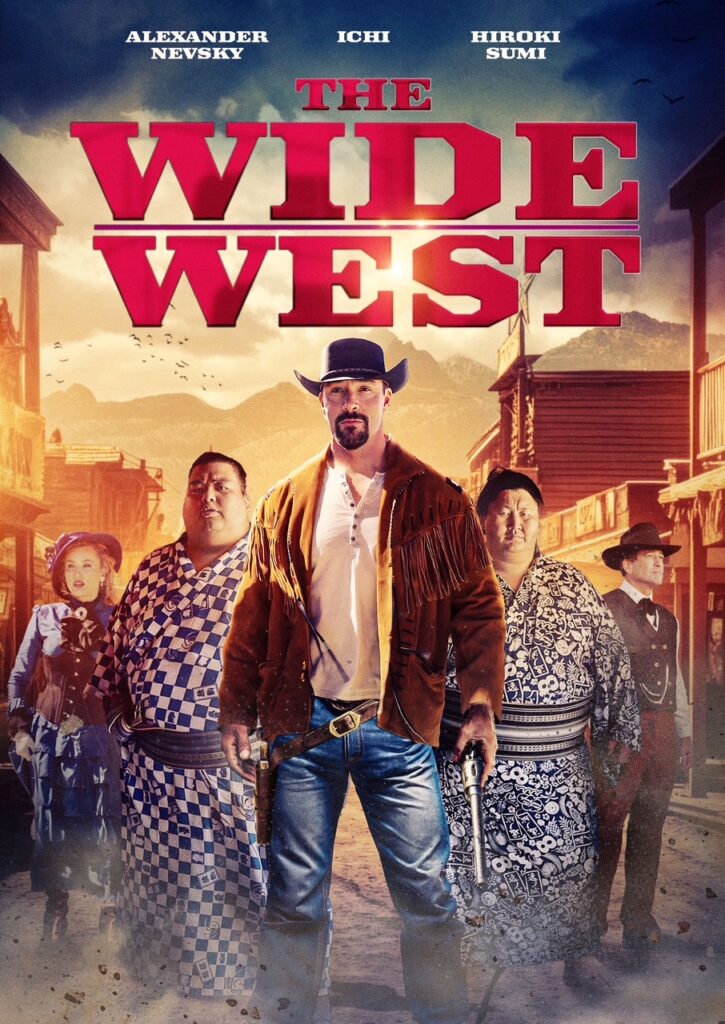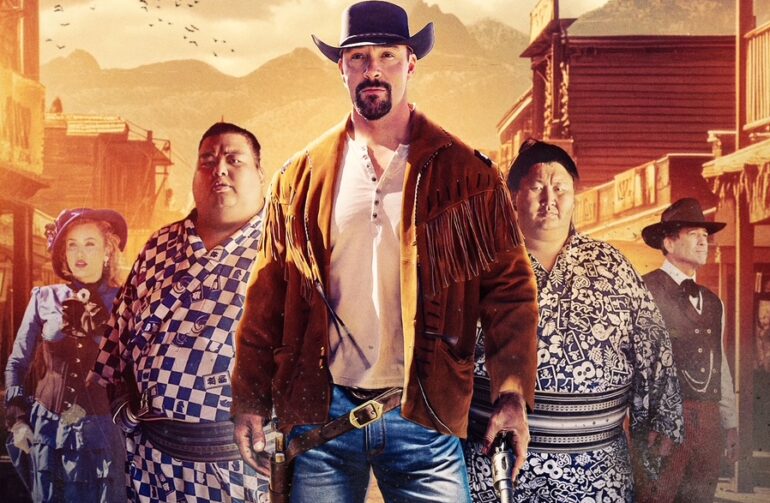Verdict
Summary
The Wide West is awfully short and at least a card or two short of a full house. It’s at least a pair or a three of a kind, though, and that’s worth betting on.
Plot:
When two Sumo wrestlers are waylaid in a small town, trouble finds them.
Review:
President Theodore Roosevelt (Lee Dawson) is visited by a Japanese ambassador and told to expect that two renowned Sumo wrestlers will be visiting him soon as a gesture of goodwill, and a gleam in his eye suggests that the president (who was notorious for his gamesmanship) is looking forward to the visit. Meanwhile, the two Japanese wrestlers and their referee (Ramy Elgazar, Takashi Ichinojo, Hiroki Sumi) are waylaid in a small town as the train is made ready for departure (we never see the train or the tracks, suspiciously). The town also has another fish out of water wander into its streets, a tall, broad-shouldered former prize fighter-turned gambler with a six-shooter at his hip, the “European” Max (Alexander Nevsky, who co-created the story). The local judge-cum-sheriff Ogburn (Nick Baillie, also a co-producer) confiscates Max’s firearm immediately, but somehow seems to have overlooked doing the same for a local hooligan who causes trouble at the saloon where he gets himself killed by one of the hulking Sumo wrestlers, whom everyone attests killed the other man in self-defense. Doesn’t matter: The judge locks the innocent foreigner up, and keeps him there for safekeeping because the man he killed was the younger brother of an even more cunning hooligan, the black-clad Jarrett (this film’s director Joe Cornet) who rides into town with a grudge. He threatens the judge that he’ll burn the town to the ground in three days if the Sumo isn’t handed over for some kind of vigilante justice, and so the judge rushes back to try to roust the town with a speech that should (in theory) convict all the men to become his quick-fired deputies, but the only man who steps up is Max … because the judge sweetens the pot with a $500 bonus if he’ll stick around and see that the next three days doesn’t just end in a massacre. Jarrett, however, doesn’t wait three days, no, he returns the next day with his gang and makes a ruckus, and it’s up to Max and Ogburn (who both literally walk together in the middle of the dusty street in broad daylight, basically putting targets on their backs) to save the town – and the Sumos – from being destroyed.
Inspired, at least in part, by a true story about a real-life Sumo wrestler who put on an exhibition match and presented President Roosevelt with a sword once upon a time, The Wide West begins well enough with a simple, easy-to-follow plot with a bit of a spin on a very old, tried-and-true trope of a small town overrun with brigands, but a couple of brave heroes who stop them (it’s High Noon … again), and yet the film somehow runs out of coal to keep the steam engines running before the film ends nearly at the 70 minute mark, with almost a full ten minutes of text explaining the true story behind the film, plus credits. Clearly, star Nevsky is the key proponent behind the film, as he puts himself (mostly) at the center of the film, though this time he’s got the added element(s) of sharing the screen with two very big Japanese Sumo wrestlers, and the film’s funniest moment comes when he’s told the town already has a couple of big foreigners in it … guys who are bigger than he is. “Bigger than me?” he says with a tilt of his eyebrows. One of the movie’s issues is that not much is done with the two Japanese wrestlers. There’s a little demonstration about halfway into the film, but then the two guys don’t really engage again or figure much into the final confrontation, which feels like a letdown. Speaking of the climax, the movie almost seems to forget to include one, as the big shootout with Nevsky is between him and one of the main villain’s henchman (who is, admittedly, not a particularly brave or fearsome character). It’s strange that Nevsky and Cornet didn’t face off because that’s what the movie was building to, and the film seems to suggest that there’s going to be a follow-up or a sequel, which is interesting because Nevsky and Cornet already have another western mini-franchise going with the Rio Bravo movies (Gunfight at Rio Bravo, Taken From Rio Bravo, etc.) they’ve been doing together. They might as well have turned this into one of those because Nevsky affects the same mannerisms, wardrobe, and laconic affectations of the character he plays in them. That aside, The Wide West is awfully short and at least a card or two short of a full house. It’s at least a pair or a three of a kind, though, and that’s worth betting on.
The Wide West is available on NBCUniversal’s Xumo Play



